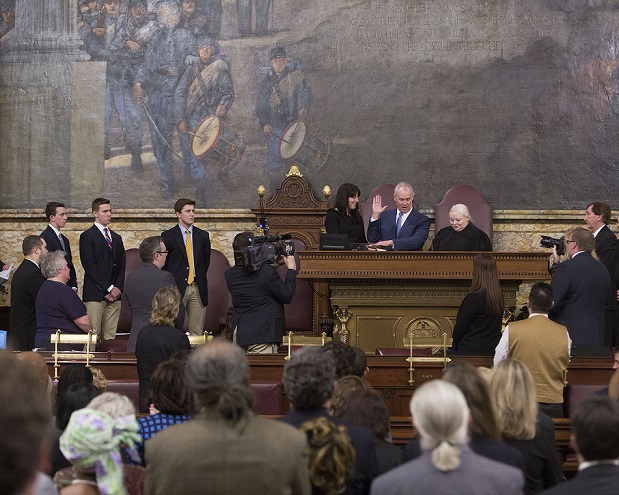HARRISBURG – The 2019-20 Session of the Pennsylvania House of Representatives opened Tuesday with the election of Rep. Mike Turzai (R-Allegheny) as speaker.
Two hundred of the 203 members took their oaths of office. The House also adopted a set of rules governing how the body operates.
“We have a responsibility to govern, and I believe all of us who have taken the oath of office today are committed to making the House and state government as a whole more open and transparent,” Turzai said.
“The mandate given to each person who just took their oath of office comes from the people and the very residents of our communities. Theirs is the only special interest that really matters.”
In a House Chamber packed with family, friends and guests, including Gov. Tom Wolf, 200 members recited the oath of office administered by the Hon. D. Michael Fisher, senior judge, Court of Appeals of the Third Circuit.
Fisher is a former member, representing the 40th Legislative District in Allegheny County. There are 43 new members, 19 Republicans and 24 Democrats.
Following the administration of the oath, Rep. Mike Peifer (R-Pike/Wayne) nominated Turzai for the position of speaker. Turzai was elected unanimously.
“We have an opportunity to move forward and find common ground as we begin this session with a clean slate,” Turzai said.
“Family-sustaining jobs, educational opportunities, bettering our communities and working together to eliminate the scourge of opioids are some of the common goals we will tackle together, Republican and Democrat, over the next two years.”
Following the election of speaker, the House voted in bi-partisan manner, to adopt the rules, which govern how the body will operate.
Some modifications of last session’s rules were made to clarify issues raised by members and leaders to help make the body more effective and efficient. A notable change addresses issues relating to sexual harassment and misbehavior in office.
The House Ethics Committee will investigate charges of sexual harassment against a member or officer of the House. A resolution of expulsion will be considered when a member is convicted of a crime relating to his or her office, rather than when sentenced.
Another reform includes the creation of a new committee, the House Government Oversight Committee. The House Government Oversight Committee will be composed of nine members (five appointed by the majority leader and four appointed by the minority leader) who will be empowered to investigate matters referred by the speaker, majority leader or minority leader.
“Our rules reflect a shared goal of improving House operations, imposing clear requirements for the handling of matters of sexual harassment, creating accountability when a member violates the trust of his or her office, and institutes other reforms like making it more difficult to work past 11 p.m.,” Majority Leader Bryan Cutler (R-Lancaster) said.
“The legislative branch of government has the solemn duty to achieve three important tasks. We make laws, appropriate the public’s money, and equally as important, we are supposed to exercise oversight over our sister branches of government.
“The new House Government Oversight Committee will help us achieve that third constitutional assignment,” Cutler added.
In response to calls to improve the operations of the House, the new House Rules adopted today will allow for legislation to be considered in a timelier fashion, eliminate the practice of “ghost amendments,” institute a House “immediate personal needs” leave policy to end “ghost voting,” and set new deadlines for filing amendments.
In his remarks, Cutler spoke of the shared agenda to create an improved atmosphere of opportunity for all Pennsylvanians and build a stronger faith of Pennsylvania’s residents in their government.
The 2019-20 Legislative Session priorities, according to Cutler, will be to change Harrisburg from the ground up by making the legislative process more deliberative and open; streamlining state government, including reviewing and evaluating each state agency; and justifying every expenditure – including the Legislature’s.
